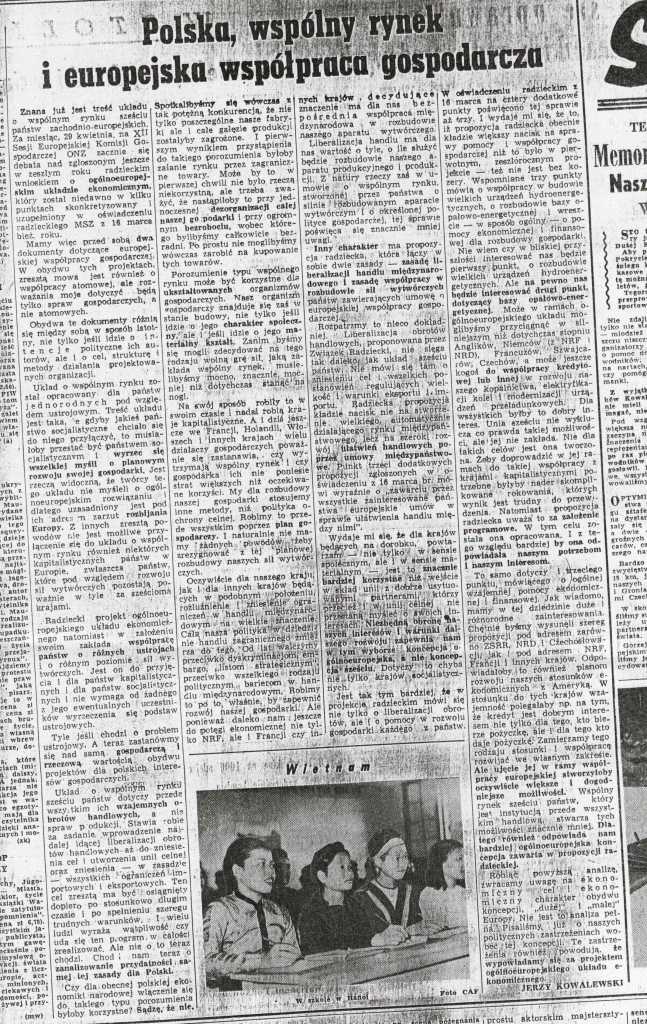National Content: Poland
Poland,common market and european economic cooperation
| Source | Article from "Trybuna Ludu” |
| Event referred to | Comparison of a EEC and european-wide economic agreement. |
| Technological characteristics | Type of file: image Extension: *.pdf Dimension: 169 KB |
| Description of the source | Kind of source: Newspaper article Origin of the source: Archive Language: Polish Copyright issues: full availability |
| Contextualisation of the source | Polish daily newspaper published from 1948, the main organ of the Polish People’s Republic propaganda. “Trybuna Ludu” had a pro-east significance and article was considered in this way. The idea of an economic coopearation suggested by a six countrys was criticized in guite strong words while comunistic proposition did not have any disadvantages at the writers view. |
| Interpretation of the source | Writer described two propositions of membership in economic projects offered to Poland. From six european countrys which wanted to establish EEC and, the second one, from USSR. He presented advantages and disadvantages of this projects and refered which one, in his opinion, is better for Poland and its economy. Author payed attention also on a social and political problems because this aspects were very important and could have strong influence on a decision (e.g. member of a EEC could not be a socialist country). |
| Original Contents | Trybuna Ludu : „Polska, wspólny rynek i europejska wspó³praca gospodarcza”– streszczenie Jerzy Kowalewski w swoim artykule prezentuje porównanie dwóch projektów ogólnoeuropejskich organizacji gospodarczych – koncepcji wspólnego rynku szeœciu pañstw zachodnioeuropejskich oraz propozycji ZSRR. Ka¿da z nich zak³ada wzajemn¹ pomoc krajów cz³onkowskich, jednak¿e na ró¿nych zasadach. Analiza dotyczy kilku aspektów, w których organizacje mia³yby siê zasadniczo ró¿niæ. Jednym z nich jest za³o¿enie, ¿e do bloku pañstw zachodnich nie móg³by przyst¹piæ kraj o ustroju socjalistycznym (a taki w³aœnie system polityczny prezentowa³a wtedy Polska). Autor tekstu zarzuca pomys³odawcom tego projektu chêæ podzielenia Europy zamiast jej jednoczenia. Pomys³ radziecki dopuszcza zrzeszanie siê pañstw ró¿norodnych ustrojowo. Zauwa¿ony zosta³ te¿ problem znacznej ró¿nicy poziomu rozwoju gospodarczego Polski i szeœciu pañstw. Uwa¿a, ¿e nasz kraj nie wytrzyma³by konkurencji znacznie lepiej rozwiniêtych i silniejszych rynków zachodnich. Gospodarka mia³aby siê za³amaæ, nast¹piæ mia³by wzrost bezrobocia, a kraj zala³aby masa towaru zagranicznego. W efekcie oznacza³oby to zubo¿enie narodu, czyli równie¿ niemo¿noœæ kupna nowych dóbr. Powa¿ne zastrze¿enia budzi³o te¿ za³o¿enie o zniesieniu ce³ miêdzy pañstwami europejskiej wspólnoty gospodarczej. W opinii fachowców realizacja tego celu by³a niepewna, a nawet jeœli realna, to niew¹tpliwie wymagaj¹ca czasu. Prawdopodobnie nie by³oby to korzystne rozwi¹zanie dla Polski z uwagi na znacznie s³absz¹ pozycjê gospodarcz¹. Natomiast zupe³nie inny charakter mia³a propozycja radziecka. Zak³ada³a ona przede wszystkim liberalizacjê handlu miêdzynarodowego oraz zasadê wspó³pracy w rozbudowie si³ wytwórczych. Wa¿nym elementem tego porozumienia mia³yby byæ umowy miêdzypañstwowe o wzajemnym u³atwieniu handlu. Projekt zak³ada³ tak¿e pomoc w rozwoju gospodarki co autorowi wydaje siê lepsze z pozycji pañstwa o nieustabilizowanej sytuacji, zarówno spo³ecznej, jak i gospodarczej. Wspomniane zosta³o oœwiadczenie z 16 marca, które zawiera³o szczegó³y planowanego wspomagania. Mia³a byæ to m. in. rozbudowa i wykorzystanie bazy opa³owo – energetycznej. Wi¹za³yby siê z tym reformy dotycz¹ce rozwoju polskiego kopalnictwa, elektryfikacji kolei oraz modernizacji urz¹dzeñ prze³adunkowych. Dziennikarz, konkluduj¹c, zwróci³ uwagê na polityczne aspekty obydwu planów, tzw. „du¿ej’ i „ma³ej” Europy (podzielonej i zjednoczonej). Pan Kowalewski jednoznacznie opowiada siê za propozycj¹ radzieck¹. |
| Original Contents (English Translation) | “Trybuna Ludu” (Peoples Tribune): “Poland, the common market and European economic cooperation” – a summary. Jerzy Kowalewski in his article presents a comparison of two projects of European economic organizations – the idea of the common market of six West European states and the USSR proposal. They both consist in the mutual help of member countries, however basing on different rules. The analysis looks at several aspects, in which organizations differ fundamentally. One of them is an assumption that a country with a socialist system (and such was the political system of Poland at the time) would not be able to accede to the block of West European states. The author accuses the originators of this project of an intention of dividing Europe instead of uniting it. By contrast, the Soviet idea allows states of various political systems to associate. A problem was also identified of a considerable discrepancy in the level of economic development of Poland and the six states. The writer maintains that our country would not hold out the competition with significantly better developed and stronger western markets. Economy would break down, a rise in unemployment would follow, and the country would be flooded by a mass of foreign goods. This would lead to impoverishment of the nation and would make purchasing new goods impossible. Serious doubts also exist as to the provision of custom duties abolition between states of the European economic community. In experts’ opinion, realization of this target was uncertain, and even if real, undoubtedly requiring time. It would probably not be a profitable solution for Poland, in view of its considerably weaker economic position. By contrast, the Soviet proposal had a different character. First of all, it envisaged liberalization of international commerce as well as introduced a principle of cooperation towards the extension of productive power. International agreements about mutual facilitation of trade would be an important element of this agreement. The project also postulates help in developing of the economy, a proposal which, to the author, seems better from the point of view of a state without a stabilized situation, both in social and economic terms. The declaration of 16 March was mentioned, which contained the details of planned help. It would include extension and utilization of the combustible energy reservoir. This would involve reforms effecting the development of Polish mining, railway electrification and modernization of trans-shipment facilities. Concluding his article, the journalist remarked on political aspects of both projects, of the so-called ‘large' and ‘small’ Europe (divided and united). Kowalewski unequivocally opts for the Soviet proposal. |
